Editor's Note: Peter is taking a much-needed summer break from writing "Fumes," although he will write a new column if news from the sport dictates as such, and we will continue our weekly racing updates in "The Line." But as a bonus, we're going to be re-running Peter's riveting series, "The Glory Days," in its entirety over the next several weeks. The inside story of Tony DeLorenzo's racing career (Peter's brother), one of the most successful Corvette racers of all time - including the fantastic exploits of the famous Owens/Corning Fiberglas Racing Team - was one of the most widely read and popular pieces ever to appear in Autoextremist.com. So enjoy, because it was a different time and a different era, one never to be repeated. -WG
By Peter M. DeLorenzo
© 2019 Autoextremist.com
Detroit. Longtime readers of Autoextremist.com know that my brother, Tony, is one of the most successful Corvette racers of all time. Tony, along with partner Jerry Thompson (both members of the Corvette Hall of Fame), formed the famed Owens Corning Fiberglas Corvette Racing Team and were the most successful duo in SCCA A-Production history, winning 22 straight races from 1969 to 1971. Tony also led the team to notable - and historic - GT victories in America's premier endurance racing events at Daytona, Sebring and Watkins Glen in the late 60s and early 70s. (You can see their Corvette Hall of Fame video here.)
But that's not how it all started. To say we had the opportunity to experience a charmed automotive life growing up is an understatement. Our father, Tony, was leader of GM Public Relations in the company's heyday, from 1957 to 1979, so many of the GM legends you've only read about - Ed Cole, Bunkie Knudsen, Zora Duntov and Bill Mitchell - just to name a very few, weren't just historical figures, but were living, breathing, larger-than-life figures who played a role in the cadence of our automotive lives. (You can read one of Peter's most requested columns, about Bill Mitchell, here - WG)
By the time Tony got the automotive bug (he is eight years my senior), our household was crawling with the latest and fastest cars GM made. Bunkie Knudsen sent over a hot Pontiac for my mom to drive every summer, usually a red Bonneville or Catalina convertible with the highest horsepower drivetrain Pontiac offered at the time (at first 389's with 3x2s, then a series of 421's). Bill Mitchell customized a '63 Corvair for us that had the Turbo engine in it before it was even offered to the public (we, of course, took it down to the Detroit Dragway to see what it would do). Ed Cole lent us his personal driver one weekend, which was a '61 409 Chevy with a manual gearbox (how's that for an executive company car?). And then there were the Corvettes. My, oh my. There were so many I'm not sure I can recall them all, but, suffice to say, the weekend Ed Cole sent over his personal driver, which was a fuel-injected '63 Sting Ray Coupe in Sebring Silver - before the car was introduced - was one of many, many highlights.
But that's not all. Tony worked at Pontiac one summer - when the Pontiac Motor Division was actually in Pontiac - and discovered an interesting little black sports car in the executive garage. Lo and behold it was an early Shelby Cobra, so early in fact that it didn't have the side vents and it had the original Shelby Cobra emblem on the nose (pre-snake). And it sat there week, after week, after week. Since John DeLorean was Pontiac's General Manager at the time - and another of GM's legends we were on a first-name basis with - Tony finally got up the nerve one day to send him a message through his secretary, asking if he could "borrow" the Cobra some weekend. And the answer came back, "sure." Needless to say one weekend turned into damn near the whole summer, and we ran the shit out of that magnificent Cobra weekend after weekend, dusting everything in sight on Woodward Avenue, and everywhere else too.
Tony's automotive bug started to turn toward sports car racing and, well, we innocently asked "big" Tony if he could order a Corvette company car for the summer. As Tony says, "He made two errors: 1.) He agreed to do it and 2.) He let us order it!" And order it we did: A Black/Black 1964 Corvette Sting Ray Coupe with Heavy Duty finned drum brakes; Heavy Duty gearbox; knock-off aluminum wheels and radio delete. Little did our father know that Tony planned to take it to SCCA Driver's School in Watkins Glen, New York. So the moment we got it we took the interior carpeting out, took the bumpers off, removed the spare tire carrier, and then we had a roll bar put in and we were good to go. Or so we thought. While Tony was sitting at his desk at Chevrolet Sales Promotion (his summer job) a few days later the phone rang. This is how he remembers it:
"Hello?"
"Tony, this is Zora Duntov." Yikes, it was the God of the Corvette calling. "Your father has ordered a heavy duty Corvette. Who is going to drive it?"
"Um… He is?!!"
Silence.
"Who is going to drive it?"
"Um, I am."
“What are you going to do with it?”
"Uhhh… I'm going to go to SCCA driver’s school at Watkins Glen."
“Ok.”
And “God” hung up. But not before requesting that we drop the car off at Chevrolet Engineering in Warren so he could "take care of a few things." Two weeks later we went back to get the car, and Zora took Tony out to the little test track that sits inside the Tech Center. And there it was, it was the same Corvette but it sat lower and it was wearing the biggest Goodyear Blue Streak racing tires that could fit inside the fenders on the knock-off wheels. Zora also pointed out that the stock exhaust system underneath now had flanges just in front of the mufflers. Those flanges had been put on by Bill Mitchell's famous Styling Garage mechanic, Ken Eschebech, so that once we got to Watkins Glen, we could attach 4' long straight pipes designed to hang on special hangers, so that they would shoot straight out the back. Because, well, you can't run a Driver's School at Watkins Glen with standard mufflers, right? Zora was a genius.
But those changes were just the tip of the iceberg. The car had been completely gone through, including the brakes, the suspension and sure enough, the engine. In retrospect, we were convinced that Zora had the engine yanked, gone through and tweaked, because the thing was a rocket.
That trip to Watkins Glen was an adventure unto itself. We arrived very late one night at the rustic Glen Motor Inn, and the one and only Vic Franzese checked us in, but not before he could show us his beautiful Lotus 11. The school went exceptionally well for Tony; at one point the Chief Instructor went to ride a couple of laps with him and emerged muttering something like "he's doesn't need any more instruction" - and that was the beginning of his racing journey. The return trip was eventful, too, as were so tired by the end of the weekend that we said "screw it" and left the straight pipes on, rattling hearts and bones all the way back.
There's more. It was getting toward the end of that summer, when dad informed us that the car had to go back to Chevrolet to be put back into stock condition. It turns out that our oldest sister's boyfriend at the time, who lived in Chicago, had expressed interest in buying the car. We took the roll bar out, piled the stock components in it and voila! It returned two weeks later as if none of it happened, with dad saying: “When that car comes back to the house, don’t touch it!” We didn't. The sad end to this chapter? The guy in Chicago had it for two days. On the second night it was stolen, stripped - and totaled.
From there it was racing, but racing something much more realistic and affordable, which was a '65 Corvair. We started out pounding around at our local track here in Michigan - Waterford Hills - and from there it was on to Nelson Ledges, Ohio and Mid-Ohio; a one-time event at an airport in Grayling, Michigan; Lime Rock Park, Vineland (New Jersey); and on and on. Two years later Tony talked Hanley Dawson, who owned Hanley Dawson Chevrolet in Detroit at the time, into sponsoring a Corvette in SCCA Racing. And after he agreed to do that, we ordered one of 20 L88 Corvettes made in 1967, in Black, of course.
The first weekend we had it we installed a roll bar, replaced the stock exhaust system with a set of "OK Kustom" headers, added a set of American Racing wheels and Firestone racing tires, and we removed the windshield, cut the windshield posts and put a plexiglass windscreen on. The debut race - and win - for Tony and that famous L88 Corvette came six weeks later in an SCCA Regional race at an obscure road race track in Wilmot Hills, Wisconsin.
And the rest? Well, the rest will be in Parts II and III.
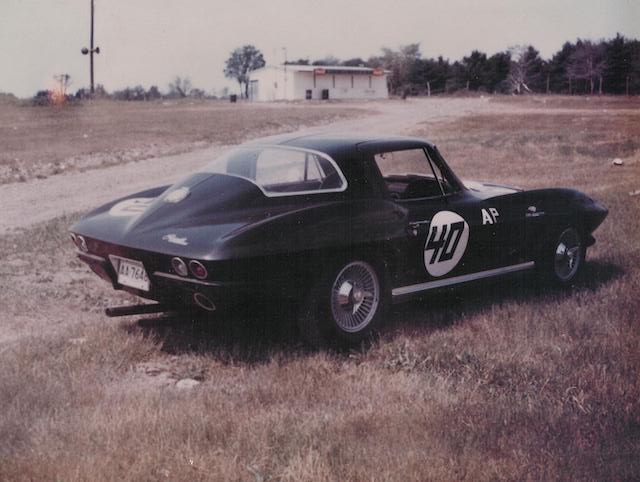
(The DeLorenzo Racing Archives)
The infamous black No. 40 "Zora-ized" Corvette Sting Ray Coupe at the SCCA Driver's School in Watkins Glen, New York, June 1964. Note those wonderful straight pipes looming out the back.
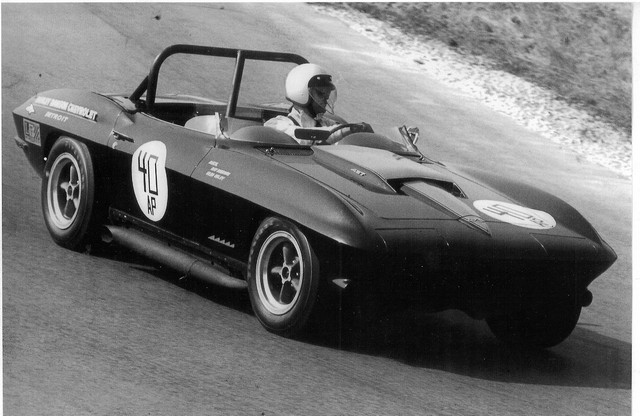 (The DeLorenzo Racing Archives)
(The DeLorenzo Racing Archives)
Tony's first race in a Corvette - and first win in "A Production" - came at an SCCA Regional in Wilmot Hills, Wisconsin, in this brand-new 1967 L88 roadster sponsored by Hanley Dawson Chevrolet, May, 1967. It was also the first time a 427 Cobra encountered the new L88 in an "A Production" race.
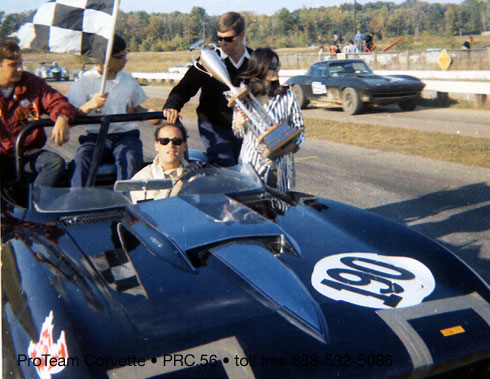
(The DeLorenzo Racing Archives)
Tony winning The Detroit News Trophy at Waterford Hills, 1967. PMD holds the checkered flag.
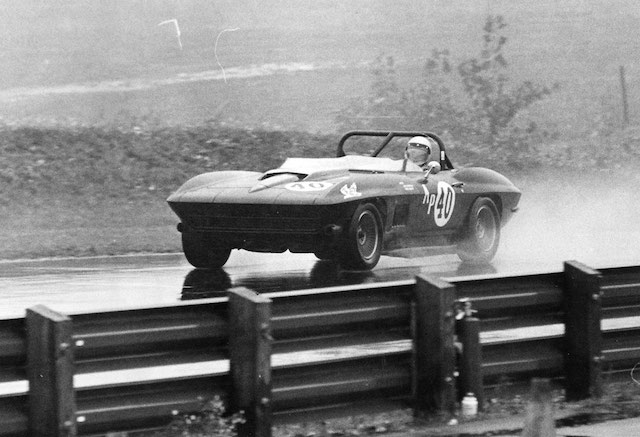
In the rain at Mid-Ohio in 1967.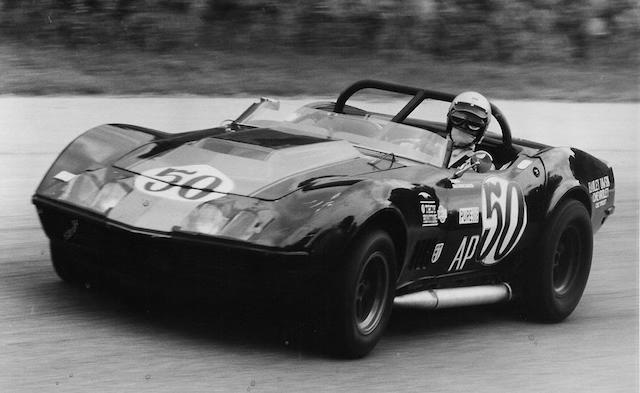 June 1968. The biggest SCCA National race at the time was the June Sprints at Elkhart Lake's Road America. Tony won "A Production" going away in his 1968 Corvette.
June 1968. The biggest SCCA National race at the time was the June Sprints at Elkhart Lake's Road America. Tony won "A Production" going away in his 1968 Corvette.
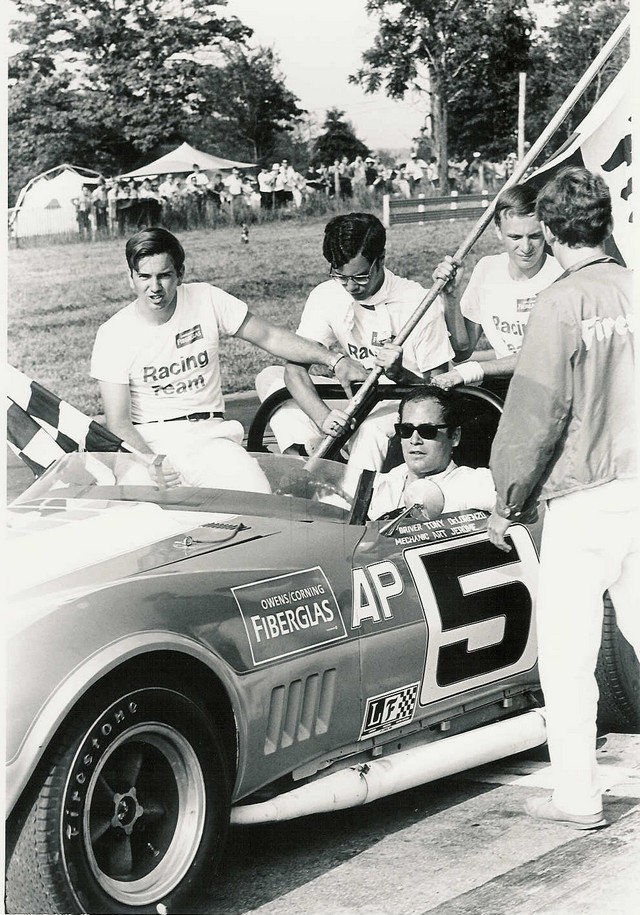
(Photo by Roger Holliday)
Ed and Dollie Cole were friends of our family. She became aware of Tony's early exploits racing a Corvette, and she was also aware that we were looking for a sponsor, as Hanley Dawson was looking to cut back his involvement. Dollie had a friend named Loris Norstad, who was an EVP at Owens/Corning Fiberglas in their New York office; so Dollie suggested that he take a look at our racing program. Since OCF was looking to gain Detroit's attention in order to land some new business, racing became the perfect marketing hook. Overtures were made and it became clear it was a natural fit, for both parties. A deal was agreed upon and the Owens-Corning Fiberglas Corvette Racing Team was born. The first race in OCF colors was a SCCA National at Mid-Ohio in August, 1968. The result? 1st in "A Production." Pictured after the win are (left to right): Art Jerome, chief mechanic; PMD; Tony; and a Lampert Firestone tech getting ready for the victory lap.
Editor's Note: Many of you have seen Peter's references over the years to the Hydrogen Electric Racing Federation (HERF), which he launched in 2007. For those of you who weren't following AE at the time, you can read two of HERF's press releases here and here. And for even more details (including a link to Peter's announcement speech), check out the HERF entry on Wikipedia here. -WG
Publisher's Note: As part of our continuing series celebrating the "Glory Days" of racing, we're proud to present another noteworthy image from the Ford Racing Archives. - PMD
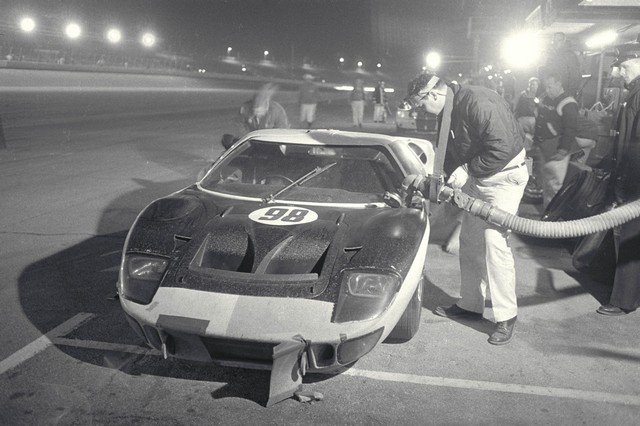
(Courtesy of the Ford Racing Archives)
Daytona Beach, Florida, February 6, 1966. The race-winning No. 98 Shelby American Ford Mk II driven by Ken Miles/Lloyd Ruby makes a scheduled night pit stop. They won the race by eight laps, leading a 1-2-3 Ford sweep. Dan Gurney/Jerry Grant (No. 97 Shelby American Ford Mk II) was second and Walt Hansgen/Mark Donohue (No. 95 Holman & Moody Ford Mk II) finished third. Watch a brief video here.